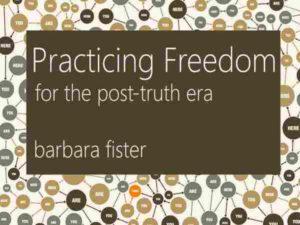 This is the text of a talk I gave at the University of New Mexico last week sponsored by the Marjorie Whetstone Ashton endowment and the university library instruction team. Thanks, team!
This is the text of a talk I gave at the University of New Mexico last week sponsored by the Marjorie Whetstone Ashton endowment and the university library instruction team. Thanks, team!
A PDF version can be downloaded from my library’s institutional repository or from Humanities Commons.
Abstract: Why do we encourage students to read widely, think critically, and conduct their own research? We are preparing them for lives in a world filled with ambiguity and complexity, where we don’t actually know the answers to what’s on the test. The surprising outcome of the recent election has prompted us to examine our assumptions about how knowledge is arrived at and shared – and why it matters. Librarians and faculty in the disciplines have long helped students learn how to find and assess scholarly information, but we haven’t always been explicit about why it matters. What we’ve come to call “information literacy” must be more than learning how to evaluate websites and recognize “fake news” as an information consumer. It’s gaining an understanding of the ways information systems shape our world while gaining the confidence and conviction that we ourselves can shape the world for the better. Paulo Freire urged us to think of education as the practice of freedom. We will explore ways to prepare students to enter a world saturated with personalized propaganda and “alternative facts” as free human beings and motivated citizens.
Continue reading “practicing freedom for the post-truth era”